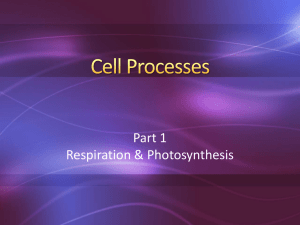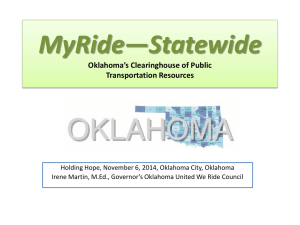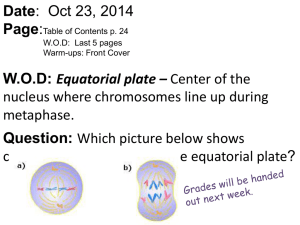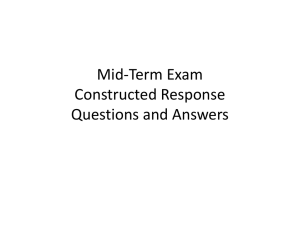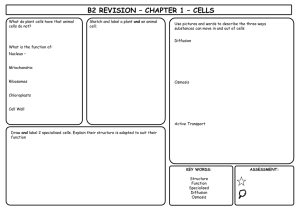Biology Lab Test 2 Review
advertisement
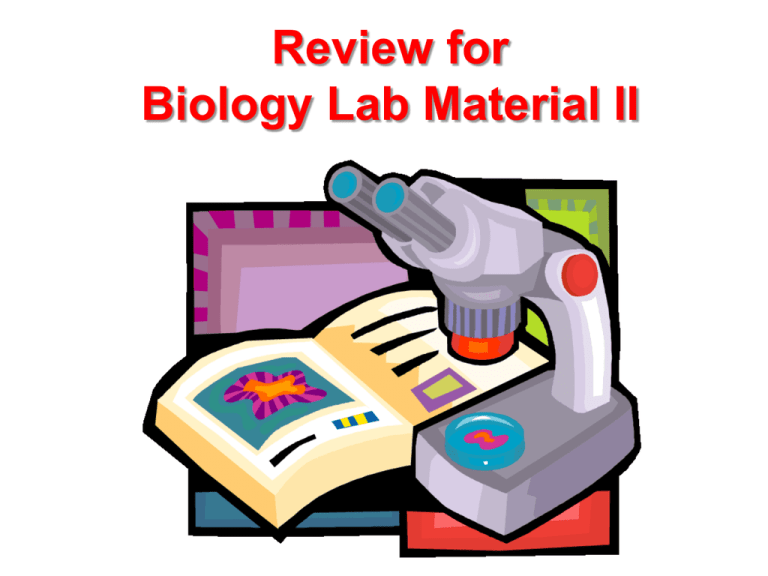
Review for Biology Lab Material II Given the Following Strands of DNA, Which Amino Acid in the Normal Strand is the First to Be Affected by the Mutation? (Continued on Next Slide) Normal Strand TAC ACA GAA GGA ____ ____ ____ ____ Mutated Strand ____ ____ ____ ____ ____ ____ ____ ____ UAC = Met UGG = Thr GAA = Leu ACA = Cys TAC ACA AGA AGG ____ ____ ____ ____ GGA = Pro GAG = Leu GGA = Pro GCC = Arg ____ ____ ____ ____ ____ ____ ____ ____ AGA = Ser AGG = Ser GGG = Pro AAA = Phe In the Previous Question, Which of the Three Types of Mutations Studied in Lab Affected the Chain of Amino Acids? What occurs During Replication in a Cell? What Occurs During Transcription in a Cell? Where, in a Cell, does Transcription Take Place? What occurs During Translation in a Cell? Which of these is used to carry the amino acids to the ribosomes in the process of translation? A. tRNA B. mRNA C. rRNA D. DNA Is the Following Part of a Strand of DNA or of RNA? T– A– C– G– G– A– Is the Following Part of a Strand of DNA or of RNA? U– A– C– G– G– A– Examine the Following Count of Allium (Onion) Root Cells Undergoing Mitosis. The Phase Number does NOT Indicate the proper sequence? Phase # #1 #2 #3 #4 #5 Total Number of Cells 10 14 13 50 13 100 Cells Question is on next page… Using the Information on the Previous Slide, Calculate the Phase Percentage for Each Phase. Phase #1 = _____% Phase #2 = _____% Phase #3 = _____% Phase #4 = _____% Phase #5 = _____% In Lab, You Calculated the Percentage of Time Each Phase Spent in the Cell Cycle. Using the Percentages you Calculated in the Previous Question, Find the Time (in Hours) out of a 12 Hour Cycle That Would be Spent in Each Phase Phase #1 Phase #2 Phase #3 Phase #4 Phase #5 = = = = = # of Cells _____ _____ _____ _____ _____ Phase % _____ _____ _____ _____ _____ Time in Hours _____ Hours _____ Hours _____ Hours _____ Hours _____ Hours Knowing that the phases previously presented are not in any particular order, which Phase of Mitosis is Probably Represented by the 50 Cell Count? a. b. c. d. e. Interphase Prophase Metaphase Anaphase Telephase As a result of the independent orientation of chromosomes during meiosis, a diploid cell can produce 2n genetically different gametes. If n = the number of different chromosomes, how many different kinds of gametes would result from meiosis if I had 4 chromosomes. Meiosis Haploid or Diploid??? Haploid or Diploid??? Haploid or Diploid??? A Male and Female Pig are Pictured Below. Which is which? What Directional Term Refers to the Front or Snout End of a Pig? What Directional Term Refers to the Hind End of a Pig? What Directional Term Refers to the Back of a Pig? What Directional Term Refers to the Belly Side of a Pig? Be Able to Identify any Structures from Lab Be Able to Identify any Structures from Lab. Be Able to Identify any Structures from Lab What is the scientific name for the pig? What kingdom is it in? What phylum is it in? What class is it in? Identify the Indicated Structures from the Fetal Pig 1. 2. 8. 9. 3. 10. 4. 11. 5. 6. 12. 7. 13. Label the Indicated Body Organs. What are the Top Chambers of the Heart? What are the Bottom Chambers of the Heart? What Internal Organ Does the Umbilical Cord Attach To In the Fetus? List the flow through the digestive system starting with the mouth. . List the flow through the excretory (urinary) system starting with the kidney. List the flow through the respiratory system starting with the nasal cavity In the human body, what is the name of the body cavity that holds the lungs? What is the name of the body cavity that holds the intestines? What muscle separates the two cavities? In the human body, what two systems can the pancreas be placed into? Which Body Systems Include the Following? Systems Respiratory Digestive Endocrine Circulatory Urinary Lung Small Intestine Brain Gallbladder Trachea Stomach Spleen Esophagus Bladder Bronchi Diaphragm Liver Heart Kidney Tongue Skin Lymphatic Nervous Integumentary Respiration/Photosynthesis Remember! 14 Alkaline / Red / Photosynthesis 7 Neutral / Orange 1 Acid / Yellow / Respiration Name the pH indicator used in the Photosynthesis/Respiration Lab. Acid was represented by the color change to _________. Basic (Alkaline) was represented by the color change to __________. The solution turns yellow due to the release of the gas _______. When carbon dioxide mixes with water it forms the compound ______________. What happens to the pH? The pH scale runs from 1-14 with 7 being neutral. A pH below 7 would be classified as being ____________, and a pH greater than 7 would be classified as being _______________. If I had my test tube with the plant, my test tube with beans, and my control test tube all placed in the light, which one(s) would I expect to turn yellow? What process(es) occur in the light? If I had my test tube with the plant, my test tube with beans, and my control test tube all placed in the dark, which one(s) would I expect to turn yellow? What process(es) occur in the dark? If I had my test tube with the plant, my test tube with beans, and my control test tube all placed in the light , which one(s) would I expect to turn red? If I had my test tube with the plant, my test tube with beans, and my control test tube all placed in the dark, which one(s) would I expect to turn red? If I add vinegar to my orange control tube, the pH will become __________ and my tube will change to the color __________. If I blow carbon dioxide into my orange control tube, the pH will become _________ and my tube will change to the color __________. Photosynthesis and Respiration In the light, plants undergo ___________ and animals undergo _______________. In the dark, plants undergo _______________ and animals undergo _______________. Carbon dioxide is consumed (or used up) during ___________ and it is produced (or given off) during ____________. Animals under the process(es) of _____________ and plants undergo the process(es) of ___________________. In plants undergoing BOTH photosynthesis and cellular respiration, the rate of _________ will be higher. What is the name of the process shown below? What is the purpose of this process? What do the bands of color represent? Identify Each Pigment Below Leaf Rubbing Why are leaves green in the summer but turn colors in the autumn? When crossing a homozygous dominant (PP) parent plant (purple) with a homozygous recessive (pp) parent plant (yellow), what is the genotype and phenotype of the F1 generation? P P p p If we then crossed two members of the F1 generation together, what would be the phenotypic ratio of the F2 generation? P P p p Assume we observed corn with 365 purple kernels and 135 yellow kernels. I want to see if what I counted matches what Gregor Mendel said I should get. What is my null hypothesis? Complete the Chi Square Using the Information from the previous slide. Purple Yellow Total O E O-E O-E2 O-E2 / E ____ ____ ____ ____ ____ ____ ____ ____ ____ ____ ____ ____ What is my Critical Value? df 1 2 3 4 p= .99 .00016 0.201 0.114 0.297 .80 0.64 0.446 1.005 1.649 .50 0.455 1.386 2.366 3.357 .20 .10 1.642 2.706 3.219 4.605 4.642 6.251 5.989 7.779 .05 3.841 5.991 7.815 9.488 How many degrees of freedom do I have? How much error am I allowing? What is my critical value? (use chart above) .01 6.635 9.210 11.341 13.277 Do I Accept or Reject My Null Hypothesis? • SALR • Smaller = Accept • Larger = Reject • Do I accept or reject my null hypothesis? What is the Phenotypic Ratio of Mendel's Classic Cross? What Type Cross Was It? Mendel’s Law of ___________ states that when meiosis occurs and gametes form, the members of pairs of alleles become separated and are not matched up again until the zygote is formed as egg and sperm unite in fertilization. Mendel’s Law of _____________ states that meiosis dictates that pairs of genes will not necessarily be inherited together. A _______ is a random change in a gene or chromosome resulting in a new trait or characteristic that can be inherited Name a disease discussed during lab that is caused by a mutation. What type of mutation caused this disease? Name another disease discussed during lab that is caused by a mutation. What type of mutation caused this disease? There are three types of mutations. What are they? Which result in a frame shift? During the Protein Lab, we actually drew out normal and mutated proteins. There are several reasons why a protein created by a mutant gene might not behave the same as a protein created by a normal gene. Name one of these reasons. When drawing the tertiary structure of a protein, we may have inserted disulfide bonds. Disulfide bonds form between two ______ amino acids occurring across from one another. Identify the process in green plants and certain other organisms by which carbohydrates (sugars) are synthesized from carbon dioxide and water using light as an energy source in the presence of plant pigments. This process releases oxygen as a byproduct. Identify the biochemical process in plants whereby specific substrates are oxidized with a subsequent release of carbon dioxide, CO2. Write the equation for Photosynthesis. Photosynthesis Equation 6 CO2 + 12 H2O + sunlight → C6H12O6+ 6 O2+ 6 H2O Name the reactants in the equation. Name the products produced by the equation. What state of matter is the reactant CO2 in? What state of matter is the reactant H2O in? What is C6H12O6? Write the equation for Respiration. Equation for Respiration. C6H12O6 + 6O2 → 6CO2 + 6H2O + Energy for ATP Through this process , the atoms of the sugar molecule are rearranged into _____ and ______ molecules. The energy that was stored in the bonds of the sugar molecule is released to make _____. Which reaction must have energy added for it to proceed? A. Photosynthesis B. Respiration Which reaction will give off energy as a product of the reaction? A. Photosynthesis B. Respiration Which reaction can only be carried out by organisms with light absorbing pigments? A. Photosynthesis B. Respiration Which reaction can only be carried out by plants? A. Photosynthesis B. Respiration Which reaction(s) can be carried out by animals? A. Photosynthesis B. Respiration Which reaction(s) can be carried out by plants? A. Photosynthesis B. Respiration Identify All the Stages of Mitosis in the Onion Root Tip Pictured Below? 3. 1. 2. 5. 4. Identify the Stage of Mitosis? Identify the Stage of Mitosis? Identify the Stage of Mitosis? Identify the Stage of Mitosis? The majority of a cells life is spent is this phase. What is the phase? The plant and animal cell pictured below show complete cell division. What is the term for complete cell division? Which cell is a plant cell? Which cell is an animal cell? Identify the Stage of Mitosis in a Whitefish Blastula Cell. Identify the Stage of Mitosis in a Whitefish Blastula Cell. Identify the Stage of Mitosis in a Whitefish Blastula Cell. Identify the Stage of Mitosis in a Whitefish Blastula Cell. Identify the Stage of Mitosis in a Whitefish Blastula Cell. What Occurs During the G1 Phase of Interphase? What Occurs During the S Phase of Interphase? What Occurs During the G2 Phase of Interphase? Prokaryotes reproduce primarily as a result of ________, the splitting of a pre-existing cell into two. Cell division usually involves two process: _________ (nucelar division) and _________ (cytoplasmic division). A ___________ is a hollow mass of cells. It is an early embryonic stage in many animals. Who Was the Father of Genetics? Genetics Give an Example of a Homozygous Allele Pair. Give an Example of a Heterozygous Allele Pair. Genetics What is the difference between a phenotype and a genotype? In general, rivers in Oklahoma tend to run from _____ to _____. Where is the driest part of Oklahoma? Which half of the state is heavily wooded? Indicate the area or region that corresponds to each Letter on the Map. A E Black Mesa Ouachita Mountains D Wichita Mountains Tallgrass Prairie Cross Timbers B C What two dominant grass species would you find in the Black Mesa Region? Blue Gramma Looks like an Eye Lash Buffalo Grass Hangs Straight from One Side What three dominant grass species would you find in the Tall Grass Region? Indian Grass Looks Like a Feather Big Blue Stem Looks Like a Turkey Track Little Glue Stem Looks Like a Pussy Willow (Fuzzy) What one dominant grass species would you find in the Cross Timbers Region? Looks Like a Feather = Indian Grass Identify the Grass Curves and leans to a one side like an eyelash = Blue Gamma Identify the Grass Straight and leans to a one side = Buffalo Grass Identify the Grass Looks like a Pussy Willow = Little Blue Stem Identify the Grass Turkey Track = Big Blue Stem Practice - Identify the Grass Practice Identify the Grass Practice Identify the Grass Practice Identify the Grass Practice Identify the Grass What is the highest point in Oklahoma? In which part of the State is it found? Which Part of the State is the Lowest Point Found In? How many natural lakes are in Oklahoma? What area of the state has the majority of reservoirs? What is Unique about the Mountains in Southeast Oklahoma? What Three Major Highway/Interstate/Turnpike Systems Divide Our State? The Bison is the state ___________. The Mountain Boomer or Collared Lizard is the state ___________. The Indian Blanket (Gaillardia pulchella) is the state ___________. The Black Swallowtail is the State ____________. The Honey Bee is Oklahoma’s State __________. The Scissortailed Flycatcher is the state ___________. Mistletoe is the state ___________. The Rose Rock is Oklahoma’s State ___________. The Watermelon is Oklahoma’s State ___________. Indian Grass is Oklahoma’s State ___________. The Rose is Oklahoma’s State ___________. What are Oklahoma’s State Colors? The State Tree is the __________. Identify these Oak Leaves. ? ? Identify this Leaf. ? What is the common name of this animal? Which region of Oklahoma would it be found? What is the common name of this animal? Which region of Oklahoma would it be found? What is the common name of this animal? What region of Oklahoma would it be found? What is the common name of this animal? What region of Oklahoma would it be found?

